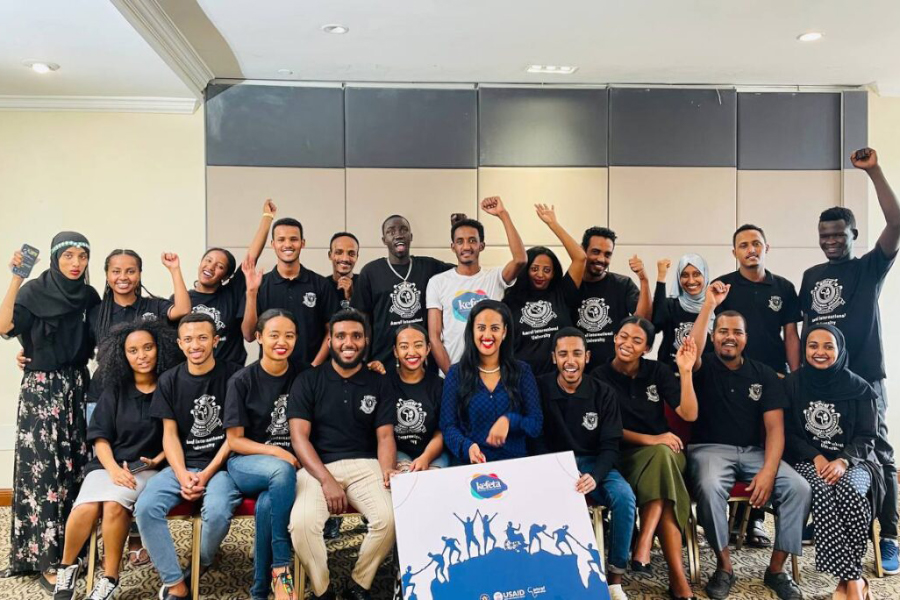
Ethiopost managers have upheld the responsibility of acquiring an e-commerce software application underlining the importance of strengthening the capacity of Ethiopia’s oldest institution for domestic and cross-border services.
A committee comprising the CEO Hanna Arayaselassie and her senior management staff was formed to oversee the procurement process. They expect to complete deploying the project within three years.
Ethiopost has been providing postal services since its establishment in 1894. Designated mail operators have had to reinvent themselves to optimise their operations and venture into new business areas to remain competitive, given the fierce competition in the postal and logistics sector, especially with the advent of e-commerce. Tasked with providing universal postal service, the institution has announced its intention to reform its institutional set-up, as well as operational and financial systems.
According to the World Bank, Ethiopost has immense potential to broaden small and medium enterprises (SMEs) to network facilitation, showcase their products to customers, and pave digital transaction services. The World Bank recently hired a consultant, Shimeles Woldehawariyat, to oversee the procurement process after EPS submitted a term of reference two months ago, disclosed Mengistu Bessir, finance officer for SMEs.
The project dubbed “Access to Finance for Small and Medium Enterprises (SMEs)” has two phases, each having four components: Lease Financing and Working Capital; Enabling Environment; Business Development Service; and Project Management Communication.
“The project will address the missing middle challenge, providing financial and technical resources to SMEs and financial intermediaries in Ethiopia,” said Francesco Strobbe, the project’s team leader.
This forms part of Ethiopia’s broader digital transformation strategy, laying out the roadmap for creating a “Digital Ethiopia” by 2025.
The Development Bank of Ethiopia facilitated the first component of the second phase, having nine commercial banks and microfinance institutions onboard. The National Bank of Ethiopia (NBE) floated the second component with an additional three million dollars. The Bank launched a movable property collateral loan and advance information system scheme its executives christened as “Credit Information System”. It was completed last month after two years of effort to hire a contractor.
The software will enable banks and microfinance institutions to access real-time information on small and medium borrowers. The data collected be available for all the commercial banks and nine microfinance institutions. It also helps SMEs to register movable assets as collateral against loans.
“The system will hold SMEs registry information in any bank and microfinance institution,” Yemenzwork Girefe, finance project coordinator under the Ethiopian Enterprise Development (EED), told Fortune.
Ethiopost launched the third component with six million Birr, additional finance from the World Bank. The project was launched a year after the postal service entered a contractual agreement with the EED to build an electronic commerce platform.
“The project will mainly focus on the manufacturing sector,” said Yemenzwork.
The Enterprise wants to add a market value benefiting 1,500 SMEs in the manufacturing sector, disclosed the Coordinator.
Israel Negash, a poultry farmer, believes the e-commerce system will help expand his business. He has found it hard to reach customers and sell products, forcing him to sell chickens and eggs door to door. He has been running poultry farms for five years in various regional states before moving to the capital. A year ago, he tried to get working capital from Addis Credit & Saving, a microfinance institution.
A father of three, Israel feels the government has not done right after he asked for finance a year ago. Israel believes the country has no appetite the farmtor as it has been getting less working capital and is the most unprivileged in accessing finance and markets.
“I asked for two million Birr loans but got 800,000 Br,” he said. “I had to wait nine months to get that finance.”
Israel sought working capital from the financing company only to be told they serve the manufacturing sector.
“I was completely heartbroken,” he told Fortune.
Belay Mengiste concurs. A business consultant at the Entrepreneurship Development Institute, he has been giving training for over 10 years to small businesspeople like Israel to help them improve their business performance, access to the market and ability to compete. They expanded their market and learned how to use the digitalised service to their advantage, Belay observed. SMEs’ most significant challenges are access to finance and lack of business development services.
“Less strategic thinking and planning is the main problem,” Belay said.
The government wants to see more people turn to manufacturing, pushing banks and microfinance institutions to provide credit to the sector.
“Government sees the manufacturing sector stirring economic growth,” he said.
PUBLISHED ON
Dec 04,2022 [ VOL
23 , NO
1179]

Commentaries | Jul 07,2024

Films Review | Mar 28,2020

News Analysis | Nov 09,2024

News Analysis | May 25,2024

Radar | Oct 12,2024

Radar | Jun 22,2024

Radar | Sep 29,2024

Radar | Feb 17,2024

Life Matters | Aug 25,2024

Sponsored Contents | Dec 31,2022

Dec 22 , 2024 . By TIZITA SHEWAFERAW
Charged with transforming colossal state-owned enterprises into modern and competitiv...

Aug 18 , 2024 . By AKSAH ITALO
Although predictable Yonas Zerihun's job in the ride-hailing service is not immune to...

Jul 28 , 2024 . By TIZITA SHEWAFERAW
Unhabitual, perhaps too many, Samuel Gebreyohannes, 38, used to occasionally enjoy a couple of beers at breakfast. However, he recently swit...

Jul 13 , 2024 . By AKSAH ITALO
Investors who rely on tractors, trucks, and field vehicles for commuting, transporting commodities, and f...

Jun 28 , 2025
Meseret Damtie, the assertive auditor general, has never been shy about naming names...

Jun 21 , 2025
A well-worn adage says, “Budget is not destiny, but it is direction.” Examining t...

Jun 14 , 2025
Yet again, the Horn of Africa is bracing for trouble. A region already frayed by wars...

Jun 7 , 2025
Few promises shine brighter in Addis Abeba than the pledge of a roof for every family...